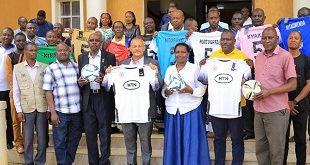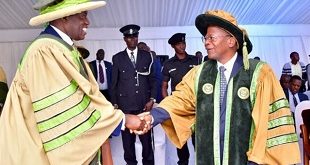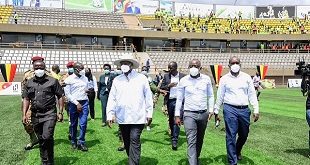
Inside the politics that have led our capital city to move from potholes to giant craters on its streets
THE LAST WORD | Andrew M. Mwenda | The road infrastructure in Kampala is in shambles. We can no longer even talk of our city roads being dominated by potholes. In fact, today we can safely say the days of potholes are the “good old days.” What has happened to roads in Kampala is that now they are dominated by giant craters. And because it has been raining a lot, the giant craters turn into mini lakes. Consequently, social media is awash with photoshopped images of President Yoweri Museveni and his dear wife, Mama Janet, in a canoe navigating a giant crater (or mini lake) in the middle of the city.
For many years, Museveni has had many explanations (now I realize they have always been excuses) to explain away apparent failures of his own aging and clearly tired administration. At one time he used to blame these failures on the legacy of either Milton Obote or Idi Amin.
He has been in power for close to 40 years. Obote and Amin have been away from Uganda’s leadership for over four decades. Both have been dead for almost 30 years. What then has happened to Uganda to have its capital city in such a sorry and despicable state? Why has Museveni presided over the collapse of our capital city into a rolling shambolic garbage dump?
I have made Museveni the centre of this debate not just because as chief executive of this country, the buck stops at his table but more critically because he is deeply involved in the budgeting process. The problem of Kampala is not its management. Its executive director, Dorothy Kisaka, and her deputy, David Luyimbazi, are 100% innocent.
The problem is simply that government does not allocate it even what one would call reasonable sums of money to fill potholes (now of course to fill the giant craters). Essentially, we created a large, talented and highly paid bureaucracy at City Hall and then denied it funds to do even the most basic work.
Since the main problem is budgetary, a process presided over by the president personally, then we need to ask why he has neglected our capital city. Some people claim that the president does not know the state of roads in Kampala. This can only be partly true because his route through the city takes him through its better road network.
Besides, the land cruisers he drives are designed to mitigate the impact of potholes. But with the giant craters on many city roads, the president can only avoid experiencing the impact by his handlers ensuring that he doesn’t pass the terrible roads.
Yet I am inclined to believe that Museveni is a president who keeps his finger tightly on the nation’s pulse. It is unlikely a crisis as monumental as the giant craters that dominate city roads can go without his handlers telling him.
And if they can successfully shield him from such a fact that is making Ugandans in Kampala angry at him, then they can also hide a coup plot from him. I don’t believe this is possible. But it is not the lack of knowledge of the terrible state of roads in Kampala, what could possibly have encouraged the president to say nothing and do nothing about it?
Two ideas come to mind. It is possible that Museveni is punishing the people of Kampala for not voting for him. In the last presidential election, he got only 126,000 votes against his infant opponent, Bobi Wine’s 384,000. This was a climb down from the 157,000 votes he got in 2016 against Kizza Besigye’s 330,000.
So, one could argue that Kampala is suffering from malicious neglect by Museveni. This is the more so given that in 2011, Museveni actually did well in Kampala, getting 245,000 votes against Besigye’s 248,000 – a difference of only 3,000 votes.
After that election, Museveni appointed and supported Jennifer Musisi in every way. He increased the budget for KCCA. He allowed her to hire the best and pay them handsomely. He gave speeches praising her. He protected her from political wheeler dealers so that she can do her job of reforming and building the city without fear or favour.
It is possible that the president expected a handsome electoral return on that investment. As already noted above, he had come close to beating his main rival, Besigye, in that 2011 presidential election. The NRM has won a majority of seats in the city council, 18 out of 27. Could Musisi’s reforms win Kampala for the president?
The opposite turned out to be the case. Musisi’s reforms annoyed many electoral segments in the city (or so many NRM bigwigs felt) and turned the city population against the president. Of course, there must have been many other reasons why NRM and Museveni lost Kampala in 2016.
Whatever the factors and combinations that caused this bad defeat, Musisi became the foul lady. Everyone blamed her. It is possible that this experience turned Museveni’s gaze away from the city and he decided to seek his electoral fortunes elsewhere. This leads us to the second explanation which is really generous to the president – benign neglect.
If Kampala is suffering from benign (as opposed to malicious) neglect, then we need to ask how this has happened. Without NRM MPs in Kampala, there are no powerful and influential figures in parliament and cabinet to make the case for the city. The executive director of KCCA and his deputy are not NRM insiders to turn the wheels of the state into their favour.
Politics is about who gets what, when, how, and why. This argument (benign neglect) is the more appealing because MPs and ministers always bargain and negotiate for resources for their constituencies. Kampala, Wakiso and Mukono, the most productive districts in Uganda (they produce 65% of our GDP and 75% of all our tax revenues), have no seat at the high table where resources are distributed.
This pattern of politics tends to create its own dynamics. When people feel that political opposition leads to economic exclusion, and in the face of an entrenched government unlikely to go away, they change their voting strategies. Northern Uganda suffered this problem for many years until it threw in the towel and began voting for Museveni and his NRM.
This led to a pattern of politics where every region has to vote for Museveni and NRM to get public goods and services. But this also causes its own dynamic as it frees NRM and Museveni from the restraints associated with political accountability. This undermines the ability of the state to serve the common good. And that is where we are now.
******

amwenda@independent.co.ug
 The Independent Uganda: You get the Truth we Pay the Price
The Independent Uganda: You get the Truth we Pay the Price



1.Bureaucracy and procurement guidelines are good practices but they have become a nightmare for service delivery in Uganda.Work comes to a stand still because there are court injunctions because some greedy person has lot a tender.Why should one person hold the whole country at ransom because he/she wasn’t awarded a tender and government just looks on?If they can procurement and contacts should be reviewed.
2. What is wrong with allowing direct procurement for little roads and works maintenance?
3.By now government should have had a data base for all service providers its a matter of just awarding contacts on rotational basis.
4.LC1 s would have been the best service providers and monitors for road works.First of all they live with the population and are easily accessible what is wrong with delegating power and allocating money for them to supervise little road works in their area then UNRA and Local government just receive reports from them?
5.Most local government and municipality leaders are both corrupt and daft i mean why would you wait for a road to collapse completely yet there is provision for roads maintenance?
6.Most budgets for Local government are meant to pay salary,allowances and court cases.
7.The works and infrastructure sections in most local governments and district are overshadowed by politics;perhaps works department should be independent and should receive resources directly from Ministry of Finance and make quarterly reports.
@Mwenda why are you theorizing when you were with the president just last week and could have asked him?
If not last week, you brag publicly about how accessible he is to you and we all know you are able to reach him.
Why not just ask and save all these words of theory.
Dear Mwenda
since 2008 , you have been singing praises to Uganda’s dictator and his family. To you, M7 and Kagame have been GOD’s presents to their countries. You have never once countenanced how the poor and oppressed people are feeling.
You are just focused on Kampala roads, go and see the state of all the secondary roads across the whole country. If they qualify to be called roads?? . Go and see the state of schools – if a village is lucky they still have a dilapidated school built in the 1990s . The unlucky villages are sending their children to be taught under trees . No wonder there is a high drop out in primary schools.
3- Go and visit the secondary schools and see the state they are in. when you were in Secondary school Uganda had so called “giant schools ” evenly distributed across the country – St Leo’s College Kyegobe; Nyakasura School ; Kigezi High ; Kinyansano boys; Mbarara High ; Kitunga Boys; Kabalega S.S.S. ; Duhaga S.S.S ; Layibi Boys; Busoga College Mwiri ; Teso College Aloet …….. These schools even in Amin’s times had beatiful infrastractures – Sports Facilities ; teaching staff quarters; Dinning halls ; Classes; Laboratories etc…. Now under M7 and Family they are in sorry state, without simple things as Laboratories, Libraries, window panes , sports facilities . Science classes are all theory ( despite the Inefficient and greedy Autocrat harping on about teaching Sciences and deciding to pay science teachers more ). Some meaningful education in Uganda is now around Kampala, Wakiso and Mukono areas. One of the reasons why Kampala is congested because while in the past, people used to move to urban areas for employment, not they move to kampala to educate their kids among other reasons.
One can even write a thesis on the state of Uganda’s schools / education.
4- Go and look at the state of Hospitals or Grade 4 and 5 treatment Centres. They are in complete and sorrowful state. No equipment ; No Doctors ; No drugs ……..People go Uganda’s hospitals to die while yourself and those in Political power are sent abroad for treatment on the poor tax-payers expense. They cannot be seen near a Ugandan treatment facility unless they are in transit to Italy; South Africa; India; Nairobi ; Germany or USA for advanced treatment.
Meanwhile, the health ministry has 4 Ministers [ like all other Ministries ] and a Health Select Committee in Parliament . Then over $150 million has been wasted on a non-existent Lubowa Hospital
UGANDA is in a Sorry State Mwenda. Wake up and smell the coffee [ as the cliche goes ] before you write your next article in praise of M7 and family